John Wilkes (1725 to 1797). Born in London to a middle class family, he was a journalist, writer, libertine, poet, adventurer, wit, radical MP, womaniser, duellist, fighter against oppression, and one of the first media celebrities.
Wilkes was also the most successful womaniser we English ever produced (at any rate, he was the most famous). He even managed to pinch Casanova’s favourite mistress, which the Italian moaned about in his memoirs. It must have been very galling as Wilkes wasn’t much to look at, having a crooked jaw and a squint, but as one smitten female put it, ‘he doesn’t squint more than a gentleman should!’
He began life as an adventurer, gaining access to aristocratic society by virtue of his wit and erudition. He soon found a patron in the Earl of Granville, a prominent Whig politician. Granville secured for Wilkes a safe seat and he entered the House of Commons. Wilkes then founded the North Briton, a newspaper which focused its acerbic satire on the incompetent ministry of Lord Bute. Issue No45 caused uproar in its unprecedented attack on the Government and by implication, the King. Wilkes became an instant celebrity in an era that had just embraced newspapers, with shops ‘cashing in’ in the form of figurines, pictures, cockades, pins and even parrots that repeated ’45 & Liberty.’ Wilkes literally caused riots, and people would tear off pieces of his clothes.
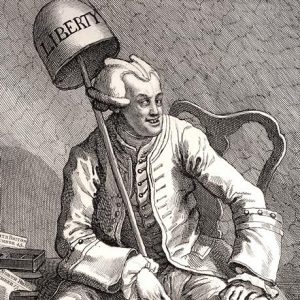
John Wilkes, drawn by his enemy William Hogarth
Even the Tory Dr Johnson was eventually won over by his charm and intelligence. Interestingly, he was referring to Wilkes when he famously said, ‘Patriotism is the last refuge of a scoundrel.’
Another reason Wilkes became infamous was his Flynning ways. A libertine who had lost his virginity aged 12, he liked to try everything and, in particular, every woman. He was elected a member of a secret society called the Monks of Medmenham, which later became known as the Hell Fire Club.
The men dressed as monks, and prostitutes were hired to dress as nuns. They were ferried by boat, at night, to the grounds of a ruined abbey on the banks of the Thames. Wilkes was known as ‘Brother John of Aylesbury’ and kept the cellar books. The quantities of claret and port consumed were quite extraordinary, even by the standards of the day.
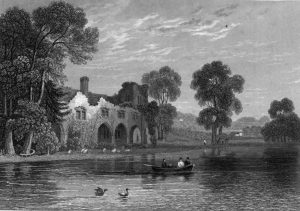
Medmenham Abbey
Wilkes loved to play practical jokes. In fact, it was said of him; ‘Jack Wilkes will sacrifice his best friend for a scurvy jest.’ Remind you of anyone? He once dressed an ape as the Devil, hid it in a chest and then unleashed it on an unsuspecting Lord Sandwich, who was then First Lord of the Admiralty.
After a few years, the ‘brotherhood’ disbanded. According to some, the orgies were relocated to the subterranean caves at West Wycombe Park in Buckinghamshire. West Wycombe, which is one of the first Palladian houses in Britain, belonged to fellow ‘monk,’ Sir Francis Dashwood, who had the grounds laid out to mimic the shape of a woman’s naked body.
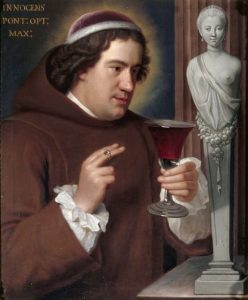
Sir Francis Dashwood, painted as a monk
Having been in the caves myself, however, I can say that they are cramped, freezing and very damp! Hardly conducive to nights of passion.
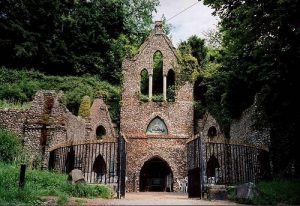
Entrance to the caves at West Wycombe Park
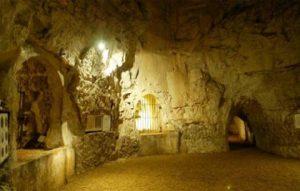
Inside the caves at West Wycombe
West Wycombe House
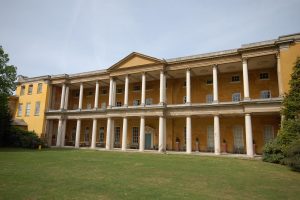
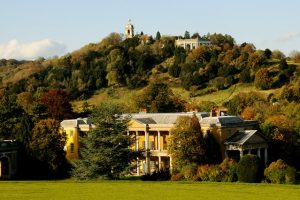
The house and, above, its private church with a hollow golden ball that could seat six men, and was used for drinking rum punches!
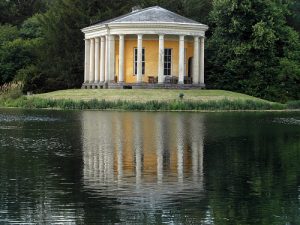
The Temple of Music
Wilkes had married young, to an older, wealthier woman. The marriage was not a success and he left, taking their daughter Polly, who was devoted to him and never married. When Wilkes had to escape to the Continent after the Parliament convicted him of ‘obscene libel’, Polly accompanied him.
After a sojourn in Italy, where Wilkes took up with a 15 year old countess who stole all his money, he returned to England, was imprisoned, re-elected to the House of Commons and went on to become Mayor of London and a supporter of American independence. He also established three vital English liberties; freedom of the press to report the proceedings of Parliament, freedom from arrest without charge, and the right to take your seat in Parliament if you have been democratically elected.
Errol would definitely have approved.
Wilkes died aged 72 at his home in Grosvenor Square and is buried in the Grosvenor Chapel, South Audley Street, London.
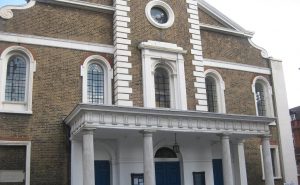
Grosvenor Chapel, Mayfair.
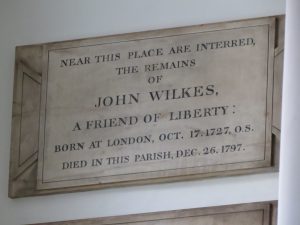
— PW
